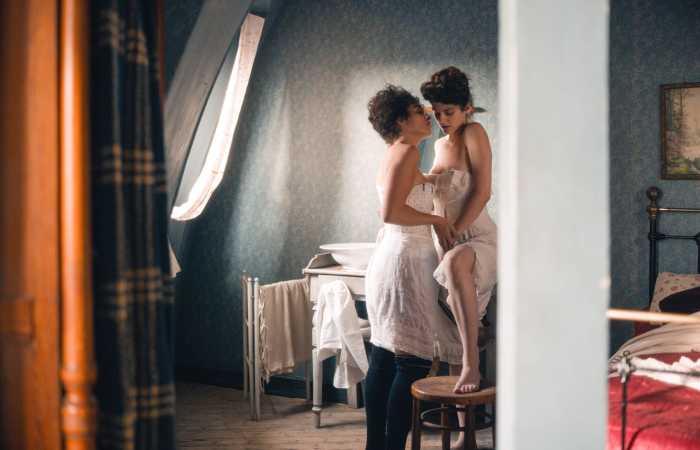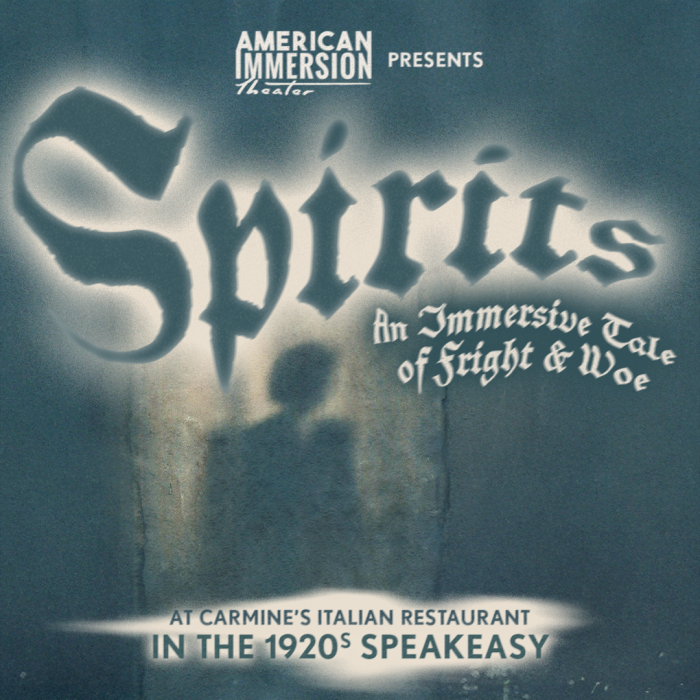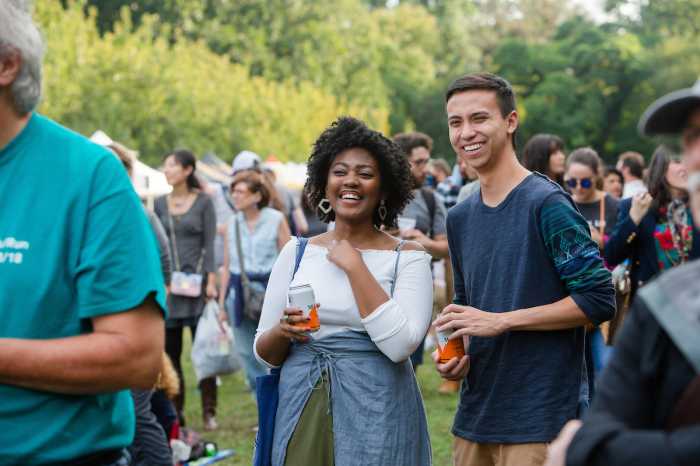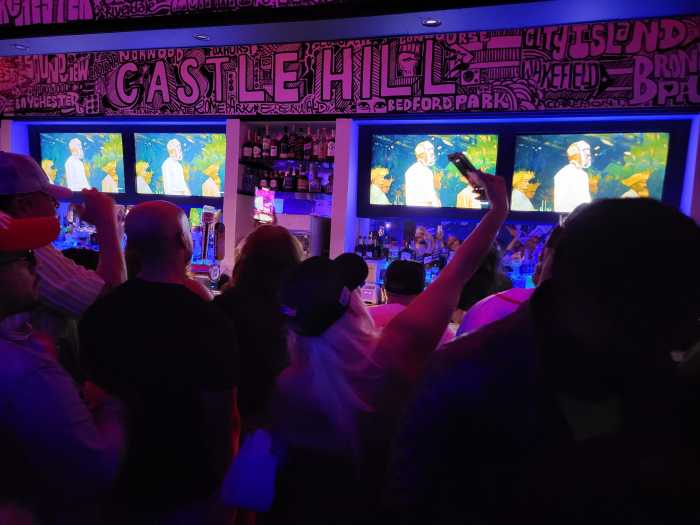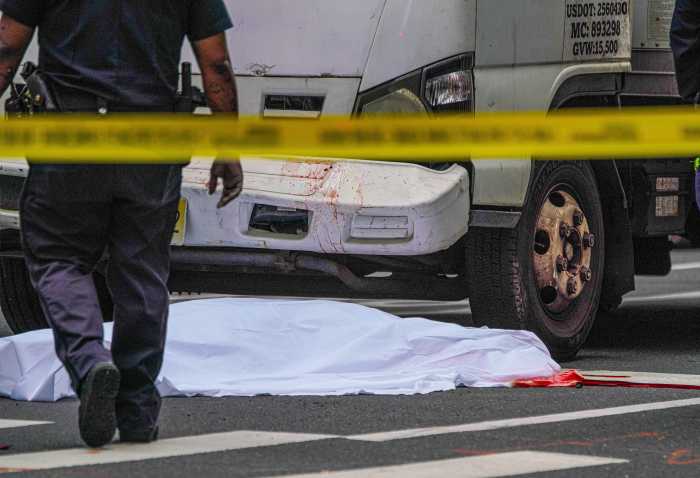The Brazilian romance film “Private Desert” is a gritty and powerful queer drama. Director/cowriter Aly Muritiba develops the story slowly, first following Daniel (Antonio Saboia), a restless policeman who is in trouble for assaulting a recruit during training. Daniel’s only joy in life is his long-distance relationship with Sara, whom he has never met. When Sara starts ghosting Daniel after he sends her a nude photo of himself, Daniel drives across the country to find her.
Sara is first seen around the film’s midpoint, and she is revealed to be Robson (Pedro Fasanaro, who is non-binary and starring in their feature film debut) — a fact that the lovestruck Daniel discovers as he finally gets to act on his desires with “Sara.” How the couple negotiates their relationship, and the impact it has on both their lives, is what makes “Private Desert” so affecting.
Fasanaro gives a very accomplished, multi-layered, and confident performance playing Robson and Sara. They spoke with Gay City News about making “Private Desert.”
What was Sara’s motivation to connect online with Daniel?
The biggest thing was love. She was not able to perform her femininity in her city, or around her family. On the internet she found a place to be herself and feel love — to be herself and connect with someone as who she is on the inside.
How did you and your co-star, Antonio, develop Sara and Daniel’s back story/relationship?
We did that in rehearsals before filming. We worked on their memories. We spoke on the phone, while blindfolded, but in the same room. We talked for hours to create memories that we’d feel when we started to film. The story starts when we meet, so we worked on connecting and building those memories.
Sara creates a sense of mystery and seduction. Robson, in contrast, is very shy, unassuming, and down to earth. There is a scene where Sara wears a dress for Daniel but then takes it off and is Robson. Can you talk about playing both characters, and how you presented them?
I had more than just two characters. There is the Robson who goes to church, the Robson who goes to work, then him with his grandma, then as Sara, the pretty girl… I had to do many different characters, and this is what we, as human beings, do — we give a lot of different performances. A trainer helped me connect with different energies to find different personalities and characters. It was organic and spontaneous. I thought of my grandma when I was with the grandmother character. I was emotional with her. It was different with Fernando (Thomas Aquino), who is my character’s best friend. Fer allows [Sara] to be the person I am. As an actor, I allow myself to be open and receive the energy other people are giving me. It’s about the dialogue and the place I was in. When Robson was working his job, I thought about when I worked a job, and I wasn’t allowed to be myself.
Likewise, what decisions did you make regarding each character’s interactions with Daniel? The scene of you both dancing and kissing are really intense and passionate.
The dancing scene was our first meeting and kiss. We had not touched each other before that. We were building the relationship through the phone, and we didn’t interact off set. We saved it for the scene, so the tension and passion were real. I didn’t know him. I was curious about him, and he was curious about me. I was meeting a guy I knew nothing about both as an actor and as a character.
There is a subplot concerning Robson’s life with his grandmother as well as the church. Both hope to “fix” his sexuality. Can you talk about trans and queer life in Brazil in general, and your own life, in particular?
We are going through a terrible moment. We have the worst president. The crimes against transgender and LGBT people are increasing. It is scary to live here, and our president thinks people should have guns and that LGBT people are “wrong.” People are harmed just walking down the street. Young people need to be able to recognize a trans person as a human being. But we can’t; it’s not allowed to be talked about in schools, so a queer child will suffer a lot — like I did in my school. But we do have a strong and loving queer community that tries to give us some support, and LGBT people are trying to get into politics. But it is dangerous; people can get murdered.
What do you think the film is saying about love and the fluidity of sexual identity?
Before the premiere we tried not to say too much about the movie. We wanted to sell it as a love story, so straight people and cisgender people can see it. I received messages saying how much this film touched them and how they are opening their minds to think about different kinds of love. Love doesn’t hurt. But I got a lot of messages saying terrible things, but the ones I care about are the ones that showed change.
How do you think a film like “Private Desert” can move the needle on LGBTQ issues?
This is something I think about with movies and TV shows. Whenever we talk about LGBTQ people it’s about acceptance — and we should talk about it — but we have to talk about different things. I am LGBTQ, and we need to talk about things that are not just about defining myself as LGBTQ. We talk about this film as a love story, but for me, it is more about self-love and how self-love stops us from crossing the limits of the other. If I am able to love myself, I can deal with the sexuality and gender of someone else. Daniel and Sara help each other understand a little more about themselves. He shows her how special she is, and how much love she can have and give to the world.
“Private Desert” | Directed by Aly Muritiba | Opening August 26 at the Quad Cinema | Distributed by Kino Lorber





